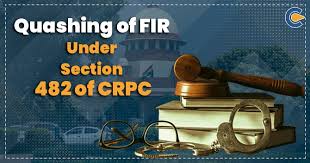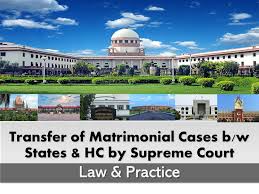Blog

Whether in case of contested divorce any other person be it parents or siblings of the Petitioner (Husband/Wife) represent the divorce through special power of attorney?
A power of attorney (POA) is a legal document giving one person (the agent or attorney-in-fact) the power to act for another person (the principal). If the power of attorney states that the attorney holder has the power and authority to file a suit and further contest it, a divorce petition can be filed through this attorney bearing the signatures of the attorney.
Once the divorce petition has been filed, the parties’ presence would be required at the stage of evidence...

QUASHING OF A COMPLAINT UNDER SEC.482
Code of Criminal Procedure, 1973 has laid out the provisions for quashing of criminal proceedings. Section 482 o CrPC says "Saving of inherent powers of High Court Nothing in this Code shall be deemed to limit or affect the inherent powers of the High Court to make such orders as may be necessary to give effect to any order under this Code Code, or to prevent abuse of the process of any Court or otherwise to secure the ends of justice." The decisions of High Courts ought to be guided by following twin objectives for quashing of a complaint/ criminal proceedings, as laid down in Narinder Singh v. State of Punjab...
Read More
TRANSFER OF A DIVORCE PETITION FROM A DISTRICT COURT
Sections 22 to 25 of the Civil Procedure Code, 1908, enact law with regards to transfer and withdrawal of suits, appeals and other proceedings from one Court to another Court.
Section 25 of the Code of Civil Procedure enables the Supreme Court to transfer any Case, appeal or other proceedings from High Court or other civil court in one State to a High Court or other civil court in any other State. This power may be exercised by the Supreme Court if it is satisfied that an order under this Section is expedient for the ends of justice. Hence wide powers are given to the Supreme Court to order a transfer if it feels that the ends of justice so require.
Read More
IRRETREIVABLE BREAKDOWN OF MARRIAGE
On 12.05.2010, the Supreme Court’s observation in Neeti Malviya vs. RakeshMalviya that period of 6 months required to be fulfilled before filing of secondmotion in a petition for divorce through mutual consent under section 13-B ofthe Hindu Marriage Act, 1956 (hereafter to be referred as HMA) cannot bewaivedofby the court under Article 142(1) of the Constitution of India gaver is eto doubts expressed in the judgements of Ajana Kishorevs.Puneet Kishore and Manish Goel vs.RohiniGoel.
Following the judgement of Neeti Malviyavs.Rakesh Malviya,the legal question concern ing the waiver of period prescribed for filing the second motion in the petition for divorce through mutual consent under HMA was referred tothe three judge bench. The threejudges bench relied on Article 145(3) of the Constitution and judgement of Pradip Chandar &Ors.vs. Pramod Chandra Patnaik &Ors.andreferred the matter to the constitution bench.
Read More
Can 6 month of cooling off period can be waived off
WHETHER PERIOD OF 6 MONTHS FOR FILING THE SECOND MOTION IN ADIVORCE THE ROUGH MUTUAL CONSENT BE DISPENSED WITH
The Hon’ble Supreme Court provided that minimum period of 6 months before filing ofthe second motion after presentation of divorce petition through mutual consentprovides time to husband and wife to introspect and reconsider their decision; however, at times it only adds to the suffering and the misery of the parties involved.
Read More